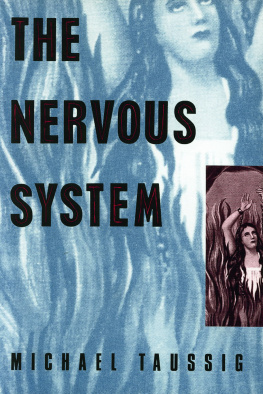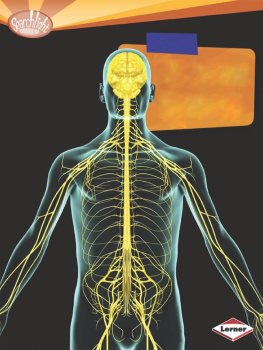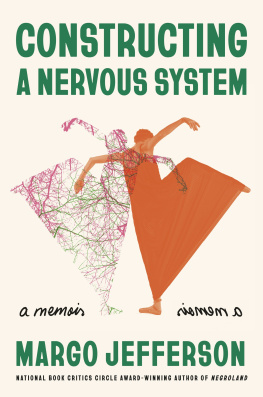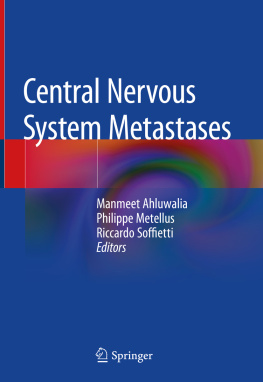Michael Taussig - The Nervous System
Here you can read online Michael Taussig - The Nervous System full text of the book (entire story) in english for free. Download pdf and epub, get meaning, cover and reviews about this ebook. year: 0, genre: Science. Description of the work, (preface) as well as reviews are available. Best literature library LitArk.com created for fans of good reading and offers a wide selection of genres:
Romance novel
Science fiction
Adventure
Detective
Science
History
Home and family
Prose
Art
Politics
Computer
Non-fiction
Religion
Business
Children
Humor
Choose a favorite category and find really read worthwhile books. Enjoy immersion in the world of imagination, feel the emotions of the characters or learn something new for yourself, make an fascinating discovery.
- Book:The Nervous System
- Author:
- Genre:
- Year:0
- Rating:3 / 5
- Favourites:Add to favourites
- Your mark:
- 60
- 1
- 2
- 3
- 4
- 5
The Nervous System: summary, description and annotation
We offer to read an annotation, description, summary or preface (depends on what the author of the book "The Nervous System" wrote himself). If you haven't found the necessary information about the book — write in the comments, we will try to find it.
The Nervous System — read online for free the complete book (whole text) full work
Below is the text of the book, divided by pages. System saving the place of the last page read, allows you to conveniently read the book "The Nervous System" online for free, without having to search again every time where you left off. Put a bookmark, and you can go to the page where you finished reading at any time.
Font size:
Interval:
Bookmark:

NERVOUS
SYSTEM
NERVOUS
SYSTEM
M I C H A E L T A U S S I N G

Published in 1992 by
Routledge
An imprint of Routledge, Chapman and Hall, Inc.
29 West 35 Street
New York, NY 10001
Published in Great Britain by
Routledge
11 New Fetter Lane
London EC4P 4EE
Copyright 1992 by Routledge, Chapman and Hall, Inc.
Printed in the United States of America
All rights reserved. No part of this book may be reprinted or reproduced or utilized in any form or by any electronic, mechanical or other means, now known or hereafter invented, including photocopying and recording, or in any information storage or retrieval system, without permission in writing from the publishers.
Library of Congress and British Library cataloguing in publication data is available.
ISBN 0-415-90444-7 (HB)
ISBN 0-415-90445-S (PB)
The author wishes to acknowledge the students in the Department of Performance Studies, New York University, for the stimulus they provided, the students in the Anthropology Departments of the Universidad de los Andes and the Universidad Nacional in Bogota, Colombia, where the idea of the Nervous System was developed in 1987, Lorna Price for her careful and sympathetic copy editing, and the following journals for having first published seven of the pieces contained herein: Social Text, Journal of Historical Sociology, History Workshop Journal, American Anthropologist, Social Science and Medicine, Cultural Anthropology, and the Stanford Humanities Review.
The tradition of the oppressed teaches us that the state of emergency in which we live is not the exception but the rule.
Walter Benjamin, Theses on the Philosophy of History.
I know of investigators experienced in this art of diversion which is a return of ethical pleasure and of invention within the scientific institution. Realizing no profit (profit is work done for the factory), and often at a loss, they take something of the order of knowledge in order to inscribe artistic achievements on it and to carve on it the graffiti of their debts of honor. To deal with everyday tactics in this way would be to practice an ordinary art, to find oneself in the common situation and to make a kind of appropriation of writing itself.
Michel de Certeau, The Practice of Everyday Life
I am working on the Nervous System, and its turning out to be hard labor indeed. Sometimes I suspect its working even harder on me than I am on it. This puts Hermeneutics and Reflexivity in a new light, since theyre now exposed as a property of the NS itself and not of the individual subject that curious entity from which many of us have grown to latterly distance ourselves. Thank God its only a fiction. Nervous System. Thats all it said, scrawled across a shed I passed on the ferry, gliding over the green waters of Sydney Harbor, whenever I went into the city, reading about the terror of the early 20th-century rubber boom in the lower Putumayo River in southwest Colombia. It was the early 1980s. The signs in the street were of unemployment, purple hair, and postmod anarchy. Apocalyptic omens. An underground doing time. And over there and far away, Colombia was in a state of siege. Torture by the State was commonplace. Paramilitary squads were on the make. Whenever I got up from my desk to cross the sunlit bay away from my other world over there and back then in those Putumayan forests, the Nervous System stared at me in the fullness of its scrawled, enigmatic, might. A portent? A voice from nowhere tugging at my distracted attention. For I could not believe let alone begin to explain the terrible material I was reading about over there and back then, and much less could I put words to it. Wrenched this way, then that, I believed it all, I believed nothing. On yes! I admit to falling foul of the whirlygigging of the Nervous System, first nervous, then a system; first system, then nervousnerve center and hierarchy of control, escalating to the topmost echelon, the very nerve-center, we might say, as high as the soul is deep, of the individual self. The massive forebrain, protuberant and hanging over the landscape, like the mushroom-shaped cloud of civilized consciousness; then the mid-brain and stem with their more primitive (according to medical science) olfactory, memory, and autonomic nervous system functions, intrinsically central, older, and self-locating, and then, dribbling down somewhat like a kids sandcastle, the spinal column with its branches, synapses, and ganglia. Its a complex picture. The tissue is irreplaceable. Its cells are unregenerative. Even while it inspires confidence in the physical centerfold of our worldly existenceat least that such a centerfold truly existsand as such bespeaks control, hierarchy, and intelligenceit is also (and this is the damnedest thing) somewhat unsettling to be centered on something so fragile, so determinedly other, so nervous. And whenever I try to resolve this nervousness through a little ritual or a little science I realize this can make the NS even more nervous. Might not the whole point of the NS be its always being a jump ahead, tempting us through its very nervousness towards the tranquil pastures of its fictive harmony, the glories of its system, thereby all the more securely energizing its nervousness?
No passion so effectually robs the mind of all its powers of acting and reasoning as fear, wrote Burke in 1757 in his essay on the sublime. To make any thing terrible, he noted, obscurity seems in general to be necessary. And as if this were not enough, he followed with the disarming observation that in reality a great clearness helps but little towards affecting the passions, as it is in some sort an enemy to all enthusiasms whatsoever.

Fear rules not only those who are ruled, but
The rulers too
Hence the sardonic wisdom of the Nervous Systems scrawling incompleteness, its constant need for a fix. Which is what, if only there were time, gives me pause. How does one side-step the NSs side stepping? How does one intervene in the power of what Burke designated as its judicious obscurity wherein, without warning, the referent bursts through into the representation itself?
The following NS impulses are attempts at just such intervening; essays written for different audiences at different times from the late 1970s through to 1990. They span two books, the first written in the mid-1970s concerning the devil as a way of figuring the world historical encounter between what Marcel Mauss called the gift and what Karl Marx called commodity fetishism, the second written in the mid-1980s concerning terror and shamanism in Looking over these essays, I am struck by their distaste for the straight line, testimony to the unsteadiness characteristic of the Nervous System, which was surely ingrained in my character-armor from a tender age yet came only and fitfully to my awareness through grinding on Marxs strange concept of commodity fetishism, as filtered through the folklore of work and exchange in Colombian plantation towns and, later on, through a specific form of shamanic healing and terror, especially state and paramilitary terror.
In a langauge I find as tempting as it is undoubtedly precious, what I was sensitized to, in those early days in Western Colombia from 1969 onward amid the dirt-poor agribusiness slums and declining peasant plots, was a certain
Next pageFont size:
Interval:
Bookmark:
Similar books «The Nervous System»
Look at similar books to The Nervous System. We have selected literature similar in name and meaning in the hope of providing readers with more options to find new, interesting, not yet read works.
Discussion, reviews of the book The Nervous System and just readers' own opinions. Leave your comments, write what you think about the work, its meaning or the main characters. Specify what exactly you liked and what you didn't like, and why you think so.










